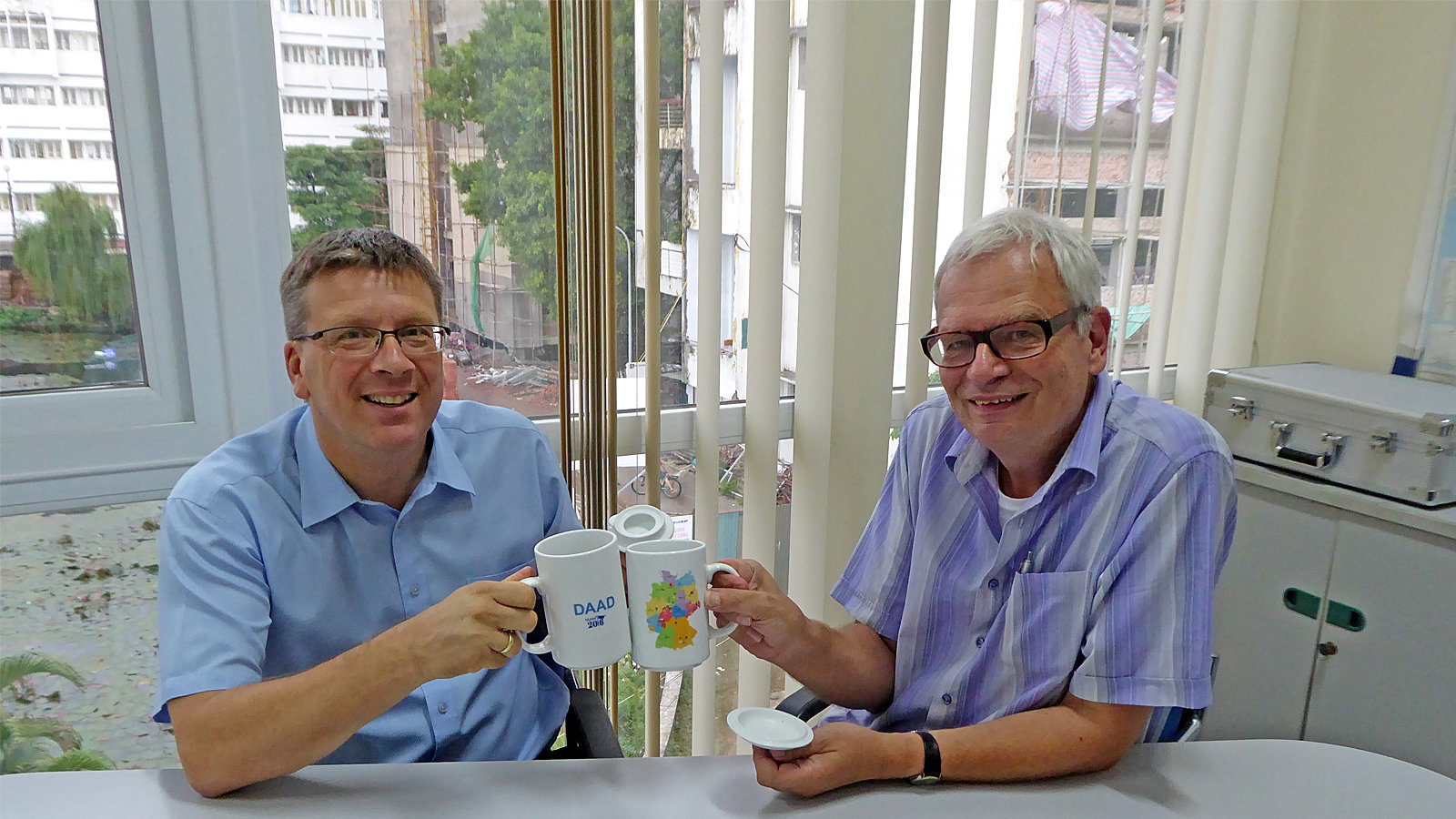Vietnamese-German cooperation redeveloped
Prof. Josef Schmied returned after 18 years to Hanoi with several new partners to discuss new cooperations
-

Vietnamese DAAD-Director Stefan Hase-Bergen (l.) and Prof. Schmied talked about a new Vietnamese-German cooperation. Photo: private
In December 1999, Prof. Josef Schmied, Chair English Language and Linguistics, was the first Vice-President of Chemnitz University of Technology responsible for International Cooperation and Development. In his capacity, the was part of a high-ranking delegation of Rectors that visited Vietnam, led by the Deputy Minister of Foreign Affairs, as the representative of the German government. Eight-teen years later, in October 2017, he had the opportunity to return to Hanoi and discuss cooperation with several new partners in universities and the German Academic Exchange Service (DAAD).
The main purpose of the 1999 visit was to inaugurate the Vietnamese-German Centre at the, then, University of Technology in Hanoi, which had been the major partner of universities in East Germany for over 20 years. In those days, many Vietnamese professors had had their training in GDR universities from Rostock to Karl-Marx-Stadt, and so Prof. Schmied enjoyed a very warm welcome in 1999, because all Vietnamese had fond memories of their youth in the GDR in the 1970s and 1980s. He attended many festivities from the big reception with hundreds of visitors enjoying German Bratwurst and Sauerkraut to smaller Alumni meetings organised by the numerous Karl-Marx-Stadt Alumni.
The Vietnamese-German Centre has been the centre of collaboration between German and Vietnamese scientists ever since, particularly because the DAAD has its regional office there. This provides a very pleasant working environment, not only for numerous local staff and several young German assistants, but also for the new director, Stefan Hase-Bergen, who had just taken up his post at the beginning of September after many years of service in the People’s Republic of China. Prof. Schmied had the opportunity to discuss intensively the options of cooperation with numerous universities in Vietnam. They also compared recent developments in China and Vietnam, because both countries are traditionally key players on the World Market, especially for textile machines, which had had an important influence on the development of the university and industry in Chemnitz.
His visit to Vietnam also provided Prof. Schmied with an opportunity to participate in a workshop on “Governance – Internationalisation – Quality-Assurance: challenges and prospects for universities in Vietnam and South East Asia”, which was organised on a wide, leafy modern campus in Thái Nguyên, a city less than hundred kilometres from the capital Hanoi with several new universities. The discussions on internationalisation were very intensive between the few international visitors, from Germany, Singapore, Myanmar, Thailand and Laos, and the many interested young scientists and administrators from Vietnam. From his recent experience in Chemnitz, Prof. Schmied had heard most of the arguments on difficulties of internationalisation but he was surprised that many big discussions in Vietnam, e.g. on university accreditation and credit transfer, were seen on a world-wide scale, comparing European and American experience, in order to find a suitable approach for Asian countries, in particular Vietnam.
The open discussion with the new head of the DAAD and the many colleagues interested in internationalisation raises the hope that the links between Chemnitz University and Vietnamese universities can be intensified, although many of the older scientists, who had gathered for the 1999 opening of the Vietnamese-German Centre at what is now called University of Science and Technology in Hanoi, have retired. However, from a European perspective, it is absolutely necessary to make it clear that Vietnamese should not only look across the Pacific to California, but also to their old partners in Germany when they discuss the options of their own university development. The Department of English has at least made a small contribution to this cooperation by accepting students from Hanoi University in an exchange programme and preparing a Summer School for their Asian partners for August 2018. However, Vietnamese universities are open for much more cooperation. (Author: Josef Schmied)
Matthias Fejes
15.11.2017




